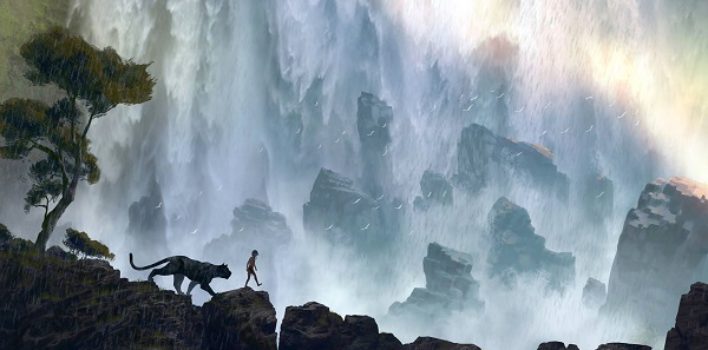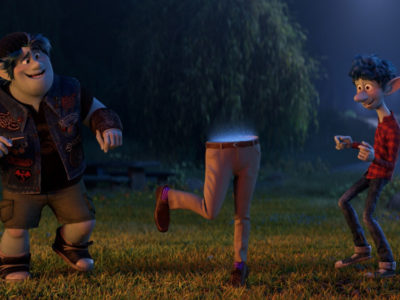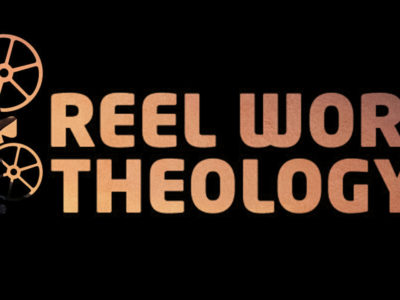Review| The Jungle Book
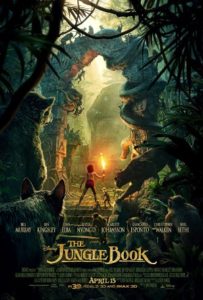 The word ‘Disney’ is almost synonymous with classic animation. Childhoods across the globe are peppered with memories of the moment they saw the prince kiss Snow White, or when the clock struck midnight at the ball, or when Pinocchio told his first lie. With 2015’s Cinderella starring Lilly James and Cate Blanchett, Disney began the difficult task of re-imagining some of their classic tales into live-action versions. Recent films heavily reliant on the technology of motion capture such as Paddington and Dawn of the Planet of the Apes have shown that technology is more than ready to tackle this challenge to bring to life such beloved characters as Baloo and King Louie.
The word ‘Disney’ is almost synonymous with classic animation. Childhoods across the globe are peppered with memories of the moment they saw the prince kiss Snow White, or when the clock struck midnight at the ball, or when Pinocchio told his first lie. With 2015’s Cinderella starring Lilly James and Cate Blanchett, Disney began the difficult task of re-imagining some of their classic tales into live-action versions. Recent films heavily reliant on the technology of motion capture such as Paddington and Dawn of the Planet of the Apes have shown that technology is more than ready to tackle this challenge to bring to life such beloved characters as Baloo and King Louie.
The opening scene does a terrific job of bringing the viewer straight into the world of Mowgli (Neel Sethi), an orphaned boy in the jungle raised by a wolf pack. Mowgli strives to keep up with his wolf brethren, chased as a test by the always present Bagheera (voiced by Ben Kingsley). Upon arrival at the wolf pack’s den, a real sense of family is immediately apparent as they recite the law of the pack: the strength of the wolf is the pack, and the strength of the pack is the wolf. Mowgli, raised as one of the pack, is encouraged to do things the way a wolf would, but discouraged from creating and building the way a man would. Most degrees of individuality are snuffed out as the pack relies heavily on one another for survival, and conformance is required. This is not shown directly as a negative, but it’s something that pops up throughout the movie and plays in Mowgli’s arc as he handles adversity.
However, any sense of fondness or nostalgia one may feel for the 1967 cartoon is short-lived. Whereas the cartoon began with Shere Khan (voiced by Idris Elba) already having returned to the jungle, and the wolf pack assuming he would seek to kill Mowgli, Jon Favreau elected to set that stage in a crucial scene at peace rock. In a year of terrible drought, the peace rock becomes visible when the river runs especially low. In such times a water truce is in effect and all animals, predator and prey, are free to drink together. Mice rest in the coils of snakes, panthers snuggle up to antelope, but the arrival of a certain tiger spoils the peace for everyone. This is where this film really begins to make its own individual stamp on the story. Shere Khan’s character is developed fully, and is more than just a tiger hungry for man flesh. The animated, 1967 Khan was devilishly suave, almost presumptively villainous, and as smooth with his words as with the swipe of his paw. This is not your animated Shere Khan.
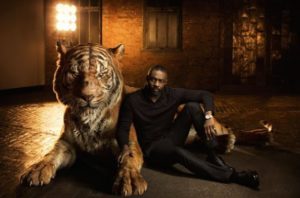 Idris Elba stands head and shoulders above his costars in handling the nuance of his characters voice. Giving him more screen time, a fully developed motivation for seeking Mowgli, and additional scenes wholly separate from how the 1967 Khan was featured and gives this film an overall darker tone and enough originality to stand as its own solid piece of storytelling, while still being a quality remake of a classic.
Idris Elba stands head and shoulders above his costars in handling the nuance of his characters voice. Giving him more screen time, a fully developed motivation for seeking Mowgli, and additional scenes wholly separate from how the 1967 Khan was featured and gives this film an overall darker tone and enough originality to stand as its own solid piece of storytelling, while still being a quality remake of a classic.
While the general tone is darker, this doesn’t deviate much thematically from the original. There is still a strong message of reliance on friends and family, identifying and relying on your pack, etc., with the added element of Mowgli dealing with obvious shortcomings of identifying as a wolf while naturally inclined to invent and create as a man would. While he takes his stand with his pack, the pack is reliant on him standing as a man rather than as a wolf. He adds more to the pack through his talents of creativity and invention than through attempts to be the same as everyone else. But nonetheless, fellowship with the pack is crucial. Survival on his own against the tiger is impossible. He relies on his pack, whether that be wolves, a bear, or a panther, at every turn. This should sound familiar to Christians, and should serve as a reminder of our need for fellowship.
The New Testament never once depicts a Christian going it on their own. We don’t find a Christian deciding they’re better off studying the words of Christ and “finding God” all by their lonesome. Faith in Christ is naturally a communal endeavor, one in which fellow believers lean on one another for support, encouragement, correction, and help in times of need and stress (Galatians 6:1f, Colossians 3:13, Acts 2:41f, 1 John 1:3). We share in fellowship with the Spirit and with believers. We have our own pack, the church. A strength of the Christian is the church; the body of believers which serves as a pillar of the truth, but also as a servant to one another. We share in fellowship because of a common faith and hope, but we serve one another individually with our gifts and talents. Just as Mowgli isn’t a wolf like the rest of his pack, we all bring our special gifts to the table when strengthening the body, while also receiving strength and encouragement from the body of believers around us.
The Jungle Book is definitely a classic tale, and now it’s one which has been given more depth and a darker sense of realism. And it’s the better for it. I found myself compelled to warn my children of a scarier story than they might expect. Where the animated version was brightly colored and the music kept things light and playful, this movie covers itself in the darker greens, grays and blacks one might expect in a jungle, while providing a musical score that under-girded a more somber and serious tone. Like Cinderella last year, The Jungle Book takes the story seriously and does not reserve itself to making the audience feel comfortable and at ease. Because of that it’s one of the scarier PG movies you’ll find today as it grapples with the real consequences of what happens in the story.
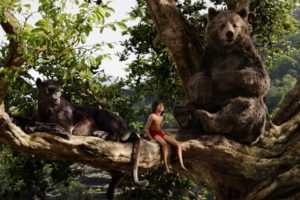 The musical numbers won’t be as memorable to today’s generation as the upbeat and catchy tunes of the original were for my childhood and those before me. But I’ll never think of Shere Khan again without Idris Elba’s voice imprinted in my mind, or Kaa’s mesmerizing eyes without pairing them with Scarlett Johansson’s soothing voice. All the casting decision aren’t perfect in my opinion. Bill Murray took some getting used to as the fearless and loyal Baloo, and Christopher Walken takes a couple minutes to sink in as King Louie, but they do all eventually grow on me and distinguish themselves from the original. It’s also interesting to think about character difference and similarities with the original. What you’ll recall as a somewhat slapstick crew of elephants are now treated with respect and reverence as they embody a quasi creator/sustainer role in the jungle. But Bagheera is basically the same as you remember. You may recall the cartoon spending very little time in the wolf pack, but in this version that family dynamic is really explored, and more characters are given opportunities to impact the story. The similarities are certainly there, but it is in the differences that I think this version solidifies itself as a very solid re-imagining of this jungle world.
The musical numbers won’t be as memorable to today’s generation as the upbeat and catchy tunes of the original were for my childhood and those before me. But I’ll never think of Shere Khan again without Idris Elba’s voice imprinted in my mind, or Kaa’s mesmerizing eyes without pairing them with Scarlett Johansson’s soothing voice. All the casting decision aren’t perfect in my opinion. Bill Murray took some getting used to as the fearless and loyal Baloo, and Christopher Walken takes a couple minutes to sink in as King Louie, but they do all eventually grow on me and distinguish themselves from the original. It’s also interesting to think about character difference and similarities with the original. What you’ll recall as a somewhat slapstick crew of elephants are now treated with respect and reverence as they embody a quasi creator/sustainer role in the jungle. But Bagheera is basically the same as you remember. You may recall the cartoon spending very little time in the wolf pack, but in this version that family dynamic is really explored, and more characters are given opportunities to impact the story. The similarities are certainly there, but it is in the differences that I think this version solidifies itself as a very solid re-imagining of this jungle world.


